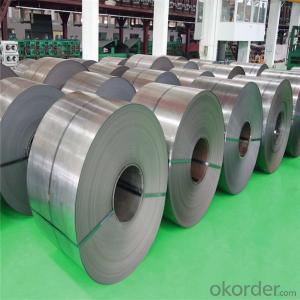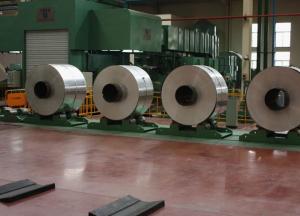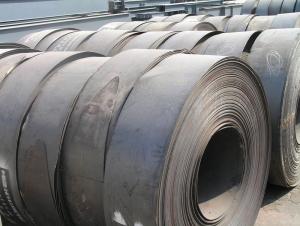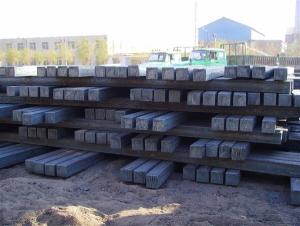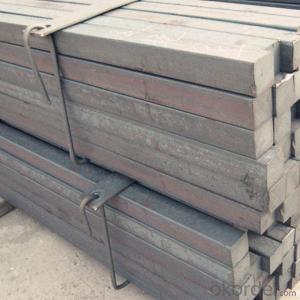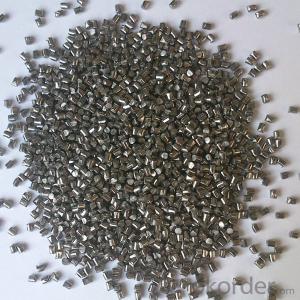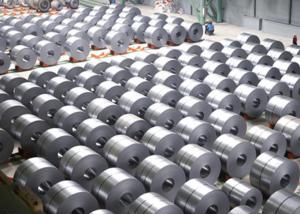Prime Quality Cold Rolled Steel Sheet/Coil China Supplier
- Loading Port:
- China main port
- Payment Terms:
- TT OR LC
- Min Order Qty:
- 20 m.t.
- Supply Capability:
- 50000 m.t./month
OKorder Service Pledge
OKorder Financial Service
You Might Also Like
Item specifice
Prime Quality SPCC Cold Rolled Steel Sheet/coil
Usage: Widely used to appliance,automobile industry or other decoration usage.
Certificate: ISO9001
Packing Details: Wrapped by water proof paper and plastic film.Covered with iron sheet,strapped by steel strips to protect the damage under transportation.
Details please check following introduction
Brief Introduction
Cold rolled steel coil is steel that has been worked below its recrystallization temperature by passing it between a pair of rollers. Recrystallization temperature is the temperature at which grains in the lattice structure of the metal have been rearranged, leaving it free of strain and deformations. Cold rolled steel coil is pre-treated before being cold rolled with a process known as pickling, which uses strong acids to remove scale and other impurities. The cold rolled steel coil is then passed through rollers to reduce its thickness. Most cold rolling takes place in multiple passes and as the size of the cold rolled steel coil is further reduced, its strength and hardness both increase, but its ductility decreases. After cold rolling, heating the metal up in a process known as annealing can restore some of its ductility. The final cold rolled steel coil may be manufactured in the form of sheets, strips, bars, or other forms.
Products Picture
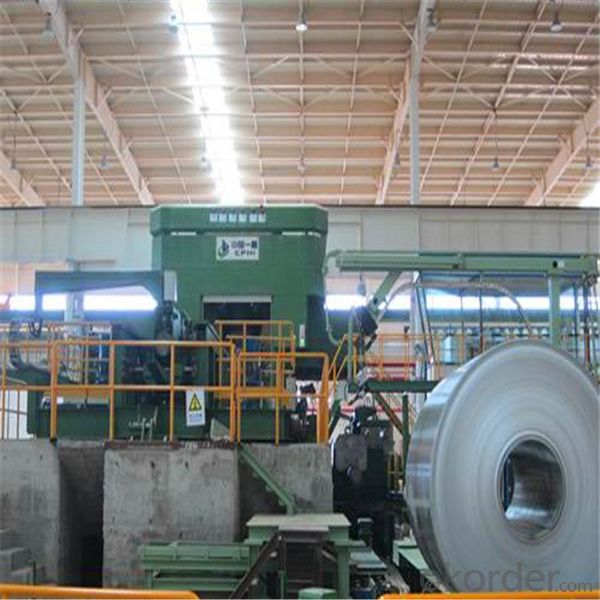
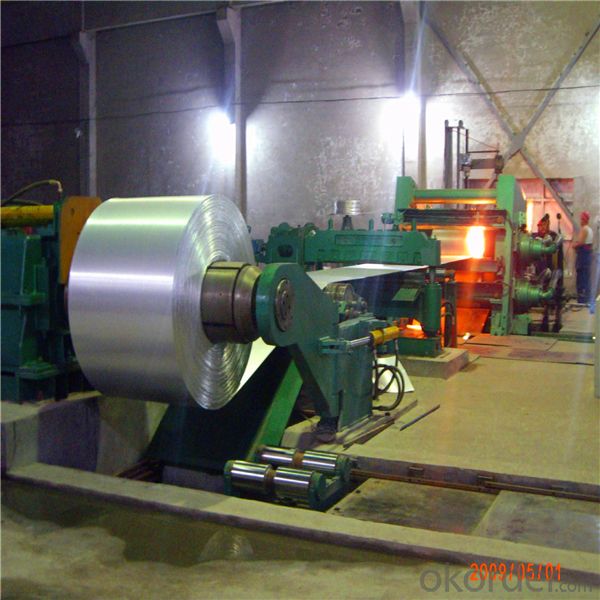
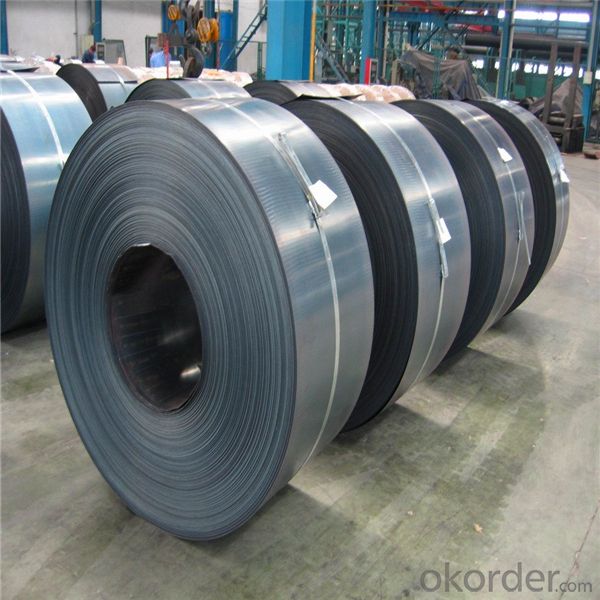
- Q:How is steel tubing used in the manufacturing of hydraulic cylinders?
- Steel tubing is commonly used in the manufacturing of hydraulic cylinders due to its high strength and durability. It provides a reliable and rigid structure to hold the hydraulic fluid and withstand the intense pressure and forces involved in hydraulic systems. The seamless construction of steel tubing ensures smooth fluid flow and minimizes the risk of leakage, making it an ideal choice for hydraulic cylinder applications.
- Q:How is steel used in the production of mining equipment?
- Steel is commonly used in the production of mining equipment due to its strength, durability, and resistance to harsh conditions. It is used to manufacture various components such as buckets, shovels, drill bits, and machinery frames, ensuring they can withstand the rigorous demands of the mining industry.
- Q:How is steel wire rope inspected for safety?
- Steel wire rope is inspected for safety through a comprehensive process that involves visual examination, non-destructive testing, and load testing. Trained inspectors carefully inspect the wire rope for any signs of wear, corrosion, or deformations that may compromise its integrity. Additionally, non-destructive testing methods such as magnetic particle inspection or ultrasonic testing are employed to detect any hidden flaws or defects within the rope. Finally, load testing is conducted to ensure the wire rope can withstand the expected loads without failure. By following these inspection procedures, the safety of steel wire ropes can be effectively evaluated and maintained.
- Q:How is steel coil produced?
- Steel coil is produced through a process called hot rolling, where a slab of steel is heated and passed through a series of rolling mills to reduce its thickness and increase its length. The steel is first cleaned and descaled, then heated to an extremely high temperature. It is then passed through a series of rolling mills that gradually decrease the thickness of the steel, while increasing its length. Finally, the steel is cooled and coiled into large rolls, known as steel coils, ready for further processing or shipment.
- Q:What are the properties of high-strength steel for structural applications?
- High-strength steel for structural applications possesses properties such as exceptional strength, excellent toughness, and superior corrosion resistance. It can withstand heavy loads and external forces while maintaining its structural integrity. Additionally, high-strength steel exhibits a higher yield strength and ultimate tensile strength compared to regular steel, allowing for the creation of lighter and more efficient structures.
- Q:How is steel used in the production of kitchen utensils and cookware?
- Steel is commonly used in the production of kitchen utensils and cookware due to its durability, heat conductivity, and corrosion resistance. It provides strength and stability to utensils like knives, spatulas, and tongs, ensuring they can withstand regular use and maintain their shape. Additionally, stainless steel, a specific type of steel, is often used for pots, pans, and baking sheets due to its excellent heat distribution and non-reactive properties with food, making it ideal for cooking.
- Q:What are the different types of steel bolts and their uses in the construction of power plants?
- There are several types of steel bolts commonly used in the construction of power plants. The most common ones include structural bolts, anchor bolts, and flange bolts. Structural bolts are used to connect heavy structural members, such as steel beams and columns, to provide stability and support. These bolts are typically high-strength and have a larger diameter to withstand heavy loads and vibrations. Anchor bolts are used to secure equipment and machinery to the concrete foundation in power plants. They are designed to provide stability and prevent movement or shifting of the equipment during operation. Anchor bolts are often embedded in the foundation and have threaded ends to attach nuts and washers. Flange bolts are used to connect piping systems, valves, and flanges in power plants. They have a washer-like flange under the head, which distributes the load and prevents leakage. Flange bolts are available in various grades and sizes, depending on the specific requirements of the application. In summary, the different types of steel bolts used in the construction of power plants serve distinct purposes. Structural bolts provide stability to heavy structural members, anchor bolts secure equipment to the foundation, and flange bolts connect piping systems and prevent leakage.
- Q:What are the applications of alloy steel in the manufacturing of heavy machinery?
- Alloy steel has various applications in the manufacturing of heavy machinery due to its exceptional strength, durability, and resistance to wear and tear. It is commonly used in the construction of components such as gears, shafts, bearings, and axles, where high strength and toughness are required to withstand heavy loads and harsh operating conditions. Additionally, alloy steel's ability to retain its mechanical properties at high temperatures makes it suitable for applications in engines and turbines. Overall, alloy steel plays a crucial role in enhancing the performance, reliability, and longevity of heavy machinery in various industries.
- Q:How is steel used in the construction of theme parks and recreational facilities?
- Steel is a crucial material in the construction of theme parks and recreational facilities due to its strength, durability, and versatility. It is used for various structural elements such as roller coaster tracks, support beams, and framework for large-scale attractions. Steel's ability to withstand heavy loads and extreme weather conditions ensures the safety and stability of these structures, making it an essential component in creating thrilling and engaging experiences for visitors.
- Q:How are steel products used in the telecommunications industry?
- Steel products are used in the telecommunications industry for various purposes, including the construction of telecommunication towers, transmission lines, and underground cable systems. Steel provides the necessary strength and durability required to support the infrastructure and ensure reliable communication networks. Additionally, steel enclosures and cabinets are used to protect sensitive equipment and cables from environmental factors, ensuring their longevity and functionality.
1. Manufacturer Overview |
|
|---|---|
| Location | |
| Year Established | |
| Annual Output Value | |
| Main Markets | |
| Company Certifications | |
2. Manufacturer Certificates |
|
|---|---|
| a) Certification Name | |
| Range | |
| Reference | |
| Validity Period | |
3. Manufacturer Capability |
|
|---|---|
| a)Trade Capacity | |
| Nearest Port | |
| Export Percentage | |
| No.of Employees in Trade Department | |
| Language Spoken: | |
| b)Factory Information | |
| Factory Size: | |
| No. of Production Lines | |
| Contract Manufacturing | |
| Product Price Range | |
Send your message to us
Prime Quality Cold Rolled Steel Sheet/Coil China Supplier
- Loading Port:
- China main port
- Payment Terms:
- TT OR LC
- Min Order Qty:
- 20 m.t.
- Supply Capability:
- 50000 m.t./month
OKorder Service Pledge
OKorder Financial Service
Similar products
New products
Hot products
Related keywords
